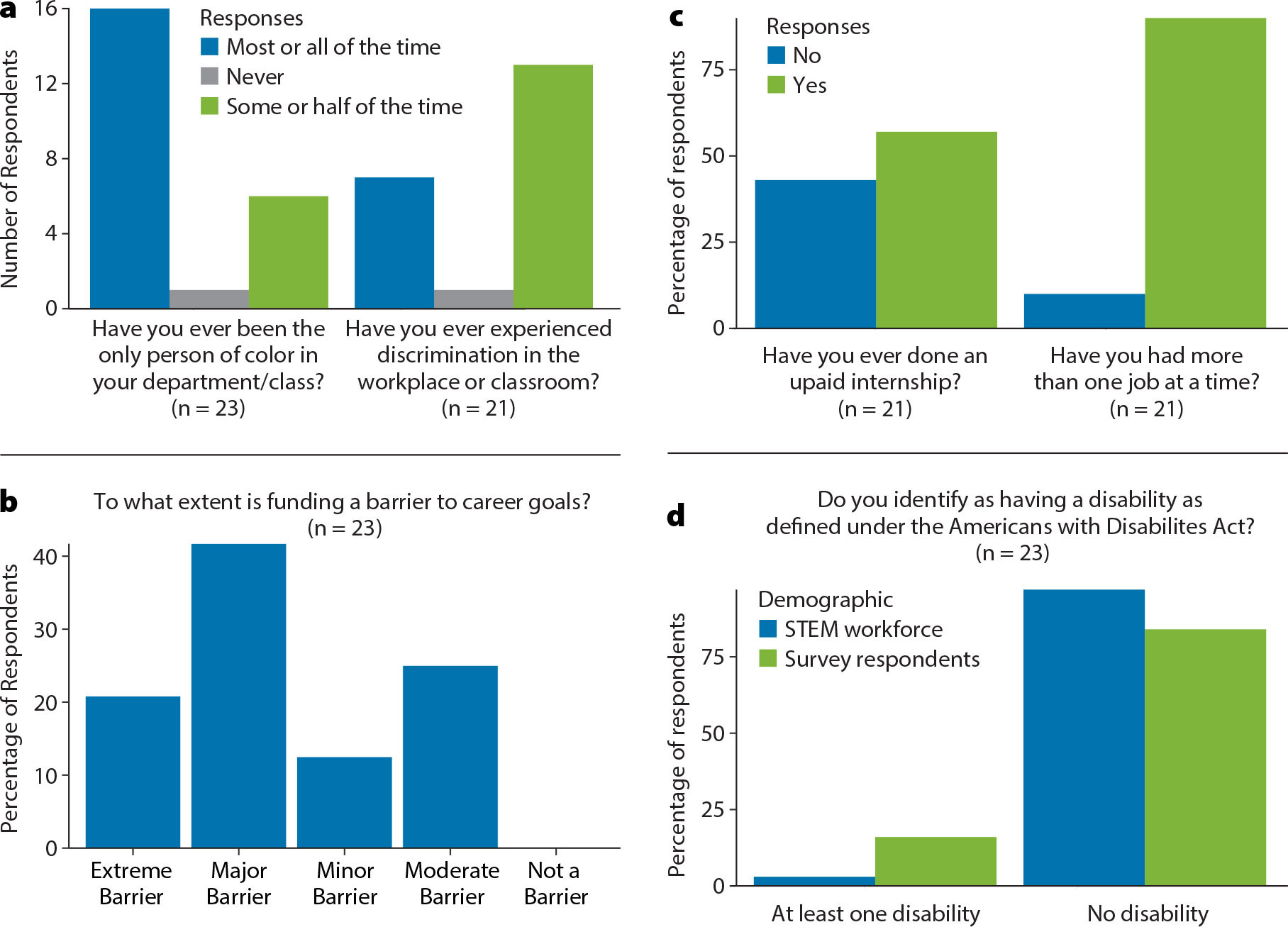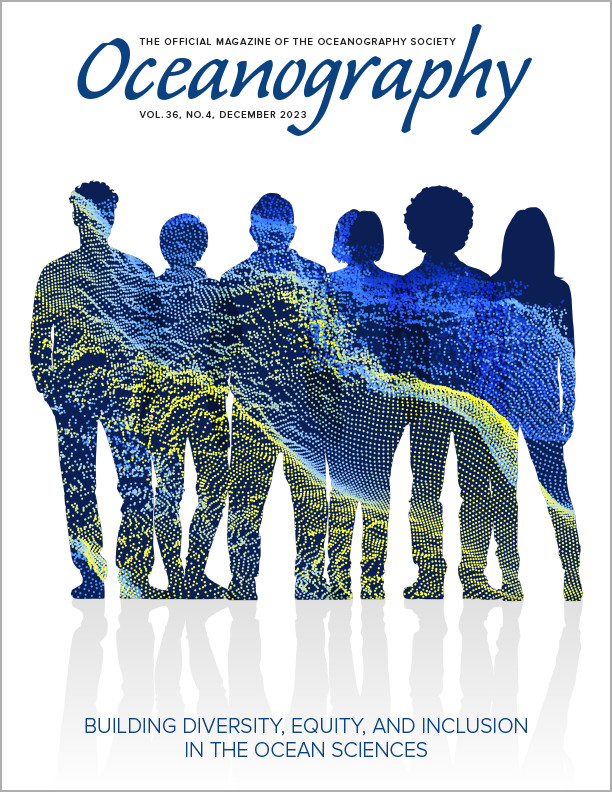INTRODUCTION
Despite various initiatives to increase representation, Black scientists, particularly Black women, are still significantly underrepresented in STEM fields. In the ocean sciences, more women than men have earned PhDs since 2009; however, there has been almost no increase in racial diversity in science in 40 years (Bernard and Cooperdock, 2018). Significant research shows that racial, ethnic, and gender diversity leads to better quality science (e.g., Page, 2008; Asai, 2020; Legg et al., 2023) and that underrepresented groups are more likely to be motivated by altruistic and cultural values (Gibbs and Griffin, 2013; Thoman et al., 2015). However, less than 1% of employed ocean science doctorates in the United States are Black women (NCSES, 2023a).
The goal of this article is to show how racial discrimination, finances, and lack of access make a career in the ocean sciences less achievable for Black women. By breaking down the findings of a survey we administered, we aim to shed light on the systemic barriers and disparities that hinder the professional advancement of Black women in this field and to foster awareness and understanding of the unique challenges they face.
All authors self-identify as Black women in the ocean sciences, and while we acknowledge that most research cited is US-specific, we hope this information can help increase the participation of Black people globally in ocean sciences and make the field more inclusive.
METHODS
In May 2023, we distributed a survey through social media and listservs to gather information from people of color who work in or have studied ocean sciences. For this paper, we used a subset of data collected from the survey: responses from 23 people who self-identified as Black women among the 46 respondents. Use of a survey was intended to capture a range of perspectives and insights related to Black women in the ocean sciences. The survey consisted of both closed and open-ended questions that aimed to solicit knowledge and perceptions of barriers to advancement along with achievable strategies for moving forward in this field (see online supplemental materials for the survey questionnaire). Participants were invited to provide their opinions, attitudes, behaviors, or demographic information, depending on the nature of the questions. The questionnaire was administered through Qualtrics to ensure convenience and accessibility for participants.
Race is a social construct; thus, who is what race is determined by individual societies, so we let participants self-identify as Black. Furthermore, we understand that gender is not binary and is complex, so for the study, the participants were asked to self-identify their gender identity.
RESULTS
Racism and Discrimination
Scholars have extensively documented the persistent barriers and racism that Black women have encountered in academia and the workforce (McGee and Bentley, 2017; Behl, 2021; King, 2023). Regrettably, our survey results indicate that these challenges remain prevalent, spanning various facets of Black women’s experiences in ocean sciences, including in undergraduate courses, internships, higher education, fieldwork, and professional environments.
A common theme noted throughout the survey was a lack of racial representation. Among the 23 respondents, 16 noted consistent status as the sole person of color in their departments or classes (Figure 1a). Experiencing exclusion, whether intentional or not, Black women must confront substantial obstacles. One survey participant stated, “I’m constantly put into a position of having to prove my knowledge and skills. I’m often micromanaged despite having more credentials than my senior.” Consequently, Black women often feel marginalized and disconnected from the material under consideration, resulting in exclusion and reduced motivation to engage. Instances from our survey showcase these issues, such as a participant being labeled “racist” by a White male professor for discussing colonialism’s scientific impacts. Other respondents describe graduate school as a “hostile environment,” and many encounter “negative comments or behavior from less educated and experienced White male colleagues.”
An additional theme regarding race and discrimination was presented: a lack of safety in the ocean sciences. Survey results underline repeated accounts of racism and discrimination among Black women ocean scientists at various stages. Among 21 of the respondents, only one reported never encountering workplace or classroom discrimination (Figure 1a). For Black women in ocean sciences, discrimination and racism are rampant. One survey respondent explained: “The amount of negative experiences are too abundant to type within this box. However, I have noticed I am most often accosted or receive negative remarks or actions from my White male colleagues, especially those who have less education and experience than myself.”

FIGURE 1. Graphs show responses to a survey of Black women in ocean sciences conducted by the authors. Data for the green bar in (d) is from NCSES (2023). STEM = Science, Technology, Engineering, and Math. > High res figure
|
Financial Barriers
Black women face multiple unique financial barriers that hinder their progress in STEM throughout the education system and as they attempt to enter the field of ocean science. These barriers can include the high cost of education, lack of funding opportunities, and racial wealth disparities. This cost is further compounded by the fact that Black students are less likely to receive merit-based financial aid or scholarships than their White peers. McFarland et al. (2019) found that 14.2% of White students and 8% of Black students received merit-based financial aid from their colleges or universities. This can result in financial strain, making it hard to enter or persist within ocean science.
Most survey respondents (over 60%) perceive funding as a major or extreme obstacle to success (Figure 1b). When exploring the specifics of these obstacles, unpaid internships and low stipends for graduate students and postdocs were suggested as barriers. Over 40% of survey respondents had unpaid internships while pursuing a career in ocean science, and over 90% have had to work more than one job at a time (Figure 1c). One survey respondent described difficulties in managing graduate school and living expenses: “If I didn’t have to work 2–3 jobs while in school, I could dedicate so much more time to my research. Seeing as I don’t come from a wealthy family, this puts me drastically behind so many others in the same field as me.”
Access
Access, as defined by Ribot and Peluso (2009), is “the ability to derive benefit from things,” and it is necessary for individuals to participate in a field actively. Lack of access significantly threatens participation and success in the ocean sciences (Osiecka et al., 2022). For Black women, a lack of access can occur in various ways, but more specifically, chronic illness and disability can impact a student’s access to STEM fields (Peterson, 2021). This correlation is reinforced by survey results, where a participant shared a disheartening experience: “I’ve even been accused of not taking my work seriously because I don’t look sick.” Compounding the issue, systemic factors contribute to a higher likelihood of disabilities among Black individuals in the United States (Goyat et al., 2016). Survey findings reveal that 16% of participants identified as having a disability under the Americans with Disabilities Act (Figure 1d), with 75% of this subset describing their disability as mental. The demanding nature of certain fieldwork courses may inadvertently exclude disabled students, disproportionately affecting Black women (Hall et al., 2002). One respondent poignantly expressed, “At this point in my PhD journey, it is evident that the department wants me to be mentally stable but does not want me to take too much time to tend to mental health.” This underscores the complex challenges faced by Black women in ocean sciences, where issues of accessibility intersect with broader systemic barriers.
Mitigation Strategies
To tackle representation gaps and microaggressions in ocean sciences, several effective strategies can be deployed. Actively recruiting Black students is only the starting point. Mentorship and resources are essential for attracting and retaining students. Mentorship programs are vital in supporting Black women’s advancement; survey results reveal that about 41% of participants credit mentorship for their journeys into ocean sciences. Establishing and nurturing safe spaces like those created by Black Women in Ecology, Evolution, and Marine Science (BWEEMS), Black in Marine Science (BIMS), Minorities in Shark Science (MISS), and Minorities in Aquaculture (MIA) foster community and open dialogue, and a sense of belonging. The survey highlights that Black women’s issues often go unheard or unaddressed. To uplift Black women in the ocean sciences, we need systems to protect them.
Reducing the strain of financial barriers in ocean science requires a multi-faceted approach. Establishing scholarships, grants, and funding opportunities specifically targeted toward aspiring Black women ocean scientists can alleviate the burden of educational expenses. Additionally, promoting livable wages for graduate students and postdoctoral researchers can reduce the financial barriers they face. Finally, identifying and meeting the needs of Black women with disabilities and other marginalized identities are essential to diversifying the field.
Our recommendations, designed to encourage members of the ocean science community to work together to create a culture where Black women can prosper, include provision of paid experiential opportunities, creation of systems to hold people accountable for or to address racial harassment, establishment of supportive peer and supervisor mentorships as well as outreach programs, and development of resources for students with chronic illnesses and disabilities.
Although many of the current barriers make it difficult to enter and persist in ocean sciences, we hope the field will become more inclusive and that all people will know ocean science is for all of us. As one respondent said, “Despite the sour experiences I have faced as a Black woman in marine science, it does not outweigh the great experiences!”
CONCLUSION
This article summarizes how the ocean sciences can be inaccessible to Black women. Racism, discrimination, lack of financial support at all career stages, disability, and chronic illness are just a few barriers that make pursuing a career in ocean sciences challenging. Intersectionality affects experience (Crenshaw, 1989), and compounding marginalized identities, such as sexuality, nationality, and socioeconomic class, affect the experiences of Black women in ocean science.
ACKNOWLEDGMENTS
The authors thank Nikki Traylor-Knowles for mentoring and creating space for Black women in marine science. We would also like to thank the survey respondents and BWEEMS, BIMS, MISS, and MIA for distributing the survey and providing communities for Black people. Lastly, thank you to Rachel Bernard, Andria Miller, and the peer reviewers for providing feedback that improved this manuscript.
DISCLOSURE STATEMENT
The authors report no conflict of interest. This research received screening for exemption approval from Duke University’s Internal Review Board (#2023-0438).


